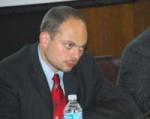
By Vladimir Kara-Murza
The date was Feb. 15, 2000, and Republican presidential hopefuls had gathered for a crucial debate in Columbia, S.C.. Among the topics of discussion was Russia and its newly anointed (but not yet formally elected) leader, Vladimir Putin. Many Western politicians were already hailing the energetic official who spoke fluent German and had worked with a reformist mayor in St. Petersburg — and who would offer a welcome change from the erratic Boris Yeltsin years. The Republican frontrunner, Texas Gov. George W. Bush, was diplomatic, noting only that “the verdict on Mr. Putin is out . . . we don’t know enough about him.” (It would take another year for Bush to “get a sense of [Putin’s] soul” and forge a partnership.)
Bush’s main challenger, Sen. John McCain of Arizona, begged to differ. “We know that he was an apparatchik. We know that he was a member of the KGB. We know that he came to power because of the military brutality . . . in Chechnya,” McCain said. “I’m very concerned about Mr. Putin. I’m afraid Mr. Putin might be one of those who wants to make the trains run on time.”
McCain’s “trains” remark was a historical reference to Benito Mussolini’s regime in Italy, and the parallel would prove frightfully close. Soon, Putin was following Mussolini’s playbook: seizing control of the media, silencing political opponents, and turning Parliament and other institutions into rubber stamps as he consolidated his authoritarian rule.
Advertisement / Reklaam
Advertisement / Reklaam
Eight years later, on Oct. 7, 2008, at another presidential debate — this time against his general election opponent, Sen. Barack Obama of Illinois — McCain once again sounded a warning on Putin, this time on his aggressive designs abroad. “I looked into his eyes and saw three letters, a K, a G and a B,” McCain said, adding that Putin “has gradually repressed most of the liberties that we would expect for nations to observe, and he has exhibited most aggressive behavior . . . in Georgia. I said before, watch Ukraine. Ukraine, right now, is in the sights of Vladimir Putin.” McCain lost, again. His challenger would go on to declare a “reset” in relations with the Kremlin, attempting a rapprochement that would end with Putin’s annexation of Crimea and his attack against Ukraine in 2014.Foresight is not necessarily a commodity in politics. Neither — looking at the political world today — are integrity or willingness to stand up for principle. Such people are often dismissed as naive and impractical idealists.McCain was an idealist, and was proud of it. He believed in his principles and was prepared to stand on them — regardless of party, convenience, or political advantage.
Much has and will be written about McCain’s military courage, his patriotism, his famed bipartisanship and his unimpeachable personal decency. His long-standing position on Russia deserves a special tribute.
Russian media reported McCain’s death as the passing of “an implacable enemy of Russia.” Nothing could be further from the truth.
He certainly was an enemy of those who have turned Russia into an autocracy (and looting ground) at home, and into an instrument of aggression abroad. “[These] people . . . are the enemies of the Russian people. They rob Russia of its wealth, its hopes, its future. They deny the God-given dignity of the people they misrule. They are thieves and murderers. And they are cowards. They fear justice. They fear truth. They fear a society in which ideals and morality are the foundation of law and order.” These were the words of John McCain at a 2015 award ceremony in Washington. The award was posthumous; it was given to Russian opposition leader Boris Nemtsov “for his courage, for giving the last full measure of devotion to his country and his countrymen.”
Advertisement / Reklaam
Advertisement / Reklaam
McCain knew Nemtsov. They would meet every time the Russian opposition leader came to Washington. I was with them at those meetings, and Nemtsov left each one of them invariably impressed by the clarity and depth of McCain’s understanding of Russia. He would always ask pointed questions and talk about concrete solutions. Vague discussions were of no interest to him. On the Magnitsky Act, on public advocacy for Russian political prisoners, and on speaking the truth about Putin’s regime, McCain was indispensable. I remember one such meeting especially well. McCain told Nemtsov that he feared for him, and that he should not go back to Russia. “It’s my country, I won’t give up this fight,” Nemtsov responded. “I have no choice.” That was in January 2014. Just over a year later, Nemtsov was dead, gunned down as he walked across a bridge in sight of the Kremlin.I am able to write this, thanks in large part, to John McCain. Eighteen months ago, when I lay in a Moscow hospital, in a coma after a severe poisoning, McCain took to the floor of the Senate to draw attention to my case. Public attention is often the only protection in these situations; and it certainly was for me.
Obituaries are usually written in advance, waiting in a desktop folder for the right moment. I could not bring myself to write this one. We all knew this day was coming, but hoped against hope that it would not be coming so soon. John McCain will be missed by many. He was a true leader and a dear friend, and it will always be among the greatest blessings of my life to know him.

